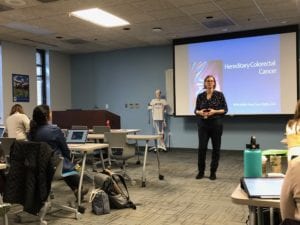Posted By: Evelyn Mantegani, Public Education & Engagement Specialist, ASHG
Kate Garber, PhD, is a member of the GENE Network and co-chair of the ASHG Public Education & Awareness Committee. She is on the faculty at Emory University in Atlanta, where she runs the genetics curriculum for medical and physician assistant students and directs courses for the genetic counseling training program. Additionally, she is a variant analyst in a clinical genetic testing lab.

ASHG: How does your approach change when communicating science to different groups?
Dr. Garber: My general philosophy is when you give somebody new information, they need a framework to hang it on. I think about how I can relate what I’m going to tell them to that prior knowledge. If I’m talking to my senior genetic counseling students, I might connect it with a patient or add a subtlety to some piece of information that we’ve already discussed. But, if I’m talking to the general public, it gets to be a very different kind of conversation. I often try to relate the information to something not science-y. So, it might be cooking and relating genes to recipes. I try to anticipate what they might already know and connect what I’m going to say to that.
ASHG: What’s something you’d like to see more of and one thing you’d like to see less of in science communication?
Dr. Garber: I would like to see less jargon in science communication. Those words can turn people off and you have no hope of getting through to them. Word choices make a difference. We scientists get so used to using them in our everyday conversation that we forget that it is jargon.
I’d like to see more scientists attempt to have more casual conversations with people without an ask. Not exclusively in the context of “because I need your blood sample “or “because I need to score NIH funding”. The whole community can move in a good direction if the general public understands what scientists do.
ASHG: What’s your best piece of advice for other science communicators?
Dr. Garber: Practice, practice, practice! Try to write about the same thing at different levels for different formats. Get a sense of how to turn the same information to connect with different audiences. Think about how to break down your research passion in different ways, whether it be an elevator pitch, a figure for a more visual person, or detailed long format that you need for an article. Keep trying to re-work things to develop that skill of getting your message out to different people.
ASHG: What’s the best memory you have of one of your educators when you were a student?
Dr. Garber: I had a research mentor when I was an undergrad, who was the first person that I did lab work for. I have this very vivid memory of sitting one-on-one in her office while she explained to me what PCR was.
The fact that she took the time to explain that to me in detail and let me ask questions really motivated me and got me excited about getting into research science in a way I had never thought about before. Those little moments are so important. She probably has no recollection of that. You never know what that spark is going to be for somebody.
ASHG: What’s the one thing you want the public to know about human genetics?
Dr. Garber: I have so many things bouncing around my head because it’s so exciting and it’s moving so fast. Genetics has such power for the individual, what we can know about them, and how we can help them. The research is so very focused toward helping people. There are so many of us who, with a lot of care and attention, are trying to think about how to use all this wonderful information to give people the answers they need to help understand themselves better.
